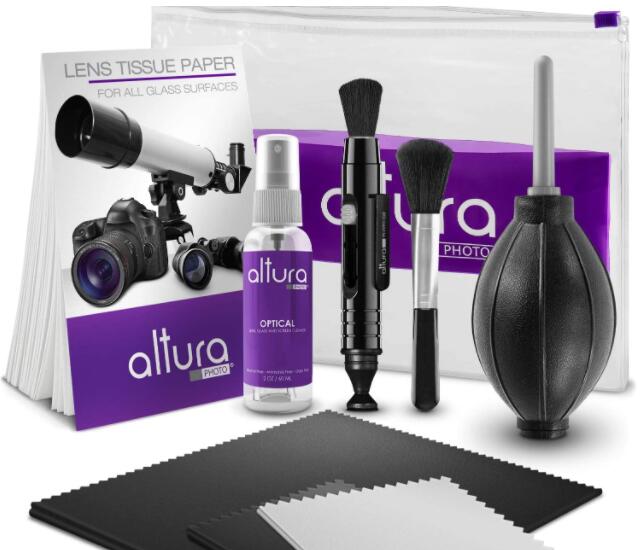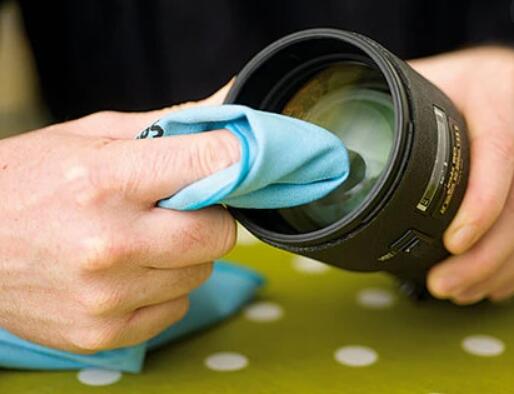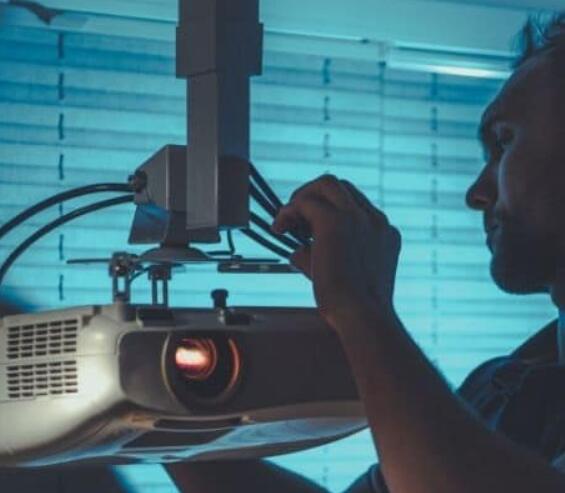
How should you go about cleaning the projector lens? Even though the projector and its lens require almost no little maintenance, it still should be cleaned occasionally to ensure it doesn’t break down from neglect. A modicum of care is still needed from you, the electronics owner, to make sure your investment doesn’t break down within its warranty period or beyond it when you can’t replace it anymore. You should also do projector lens cleanup in such a way that doesn’t involve voiding the warranty or causing customer-induced damage (CID).
With that in mind, keep on reading. Here are the things you can do in order to properly clean your lens before it gets damaged permanently. Also, remember to avoid cleaning the lens while the projector is turned on. This is because the bright beam of light from the lens could hit your eye and damage it. Projector light can be quite bright so it’s best to clean the device while it’s turned off.
Contents
What to Use to Clean Projector Lenses?

The projector lens is made from sensitive glass that is highly susceptible to damage. Using the right equipment is important for cleaning projector lenses. At the very least, you will require a lens spray and a cleaning cloth. It is essential to use a microfiber towel specially meant for glass surfaces to clean projector lenses. Harsh or abrasive materials can scratch the lens and damage it permanently. It will impact the quality of the imagery projected by the device. Special lens-cleaning papers or wipes are made explicitly to clean projector lenses.
Many sprays are available in the market for cleaning projector lenses. Regular glass cleaners may not be suitable for them. They may contain harsh chemicals that can permanently damage the lens surface. It is crucial that the lens cleaning liquid or spray must also be free of flammable substances. The lamp used in a projector generates heat and may cause a fire if an inflammable cleaner is used.
Additionally, there are many professional lens cleaning kits available for projectors and electronic devices. They are quite cheap, costing only a few bucks. The kit has all items required to clean projector lenses. It may include a spray, brush, pen, blower, tissue papers, and microfiber towels for lens cleaning. The lens cleaning kit may be suitable for individuals who have to clean multiple devices with lenses.
How To Clean A Projector Lens
To finish your cleaning process without any hurdles, you should first complete your cleaning kit. It includes:
- Lens cleaning papers
- Microfiber cloth
- Tissue papers
- Lens cleaning solution
- Compressed air
A quick tip: don’t use a chemical that causes abrasion. Only use a lens cleanser made for cleaning the lens. It is because the harsh chemical may damage the lens coating.
Step 1: Turn off The Projector
When you start to clean the projector, you must first turn it off and unplug from power and the wall. If the projector is still warm or hot, give it time to cool before you start. We know that when the projector runs for a whole three or four hours, it can get really hot. It’s more brittle when it’s still hot cooling is the right option for safety. When the lens is cool, it’s safe to clean since it’s unlikely to break easily. The first step is not hard at all.
You have to do it as instructed on cooling, or else the lens will break to pieces when still hot. When the projector’s lens is all cool, then its time to open the projector. Remember that all of the projector models are different, and it would be better to look at the given manual. The manual helps you to understand the way you can open the projector safely. There’s a latch or button on the projector housing in most projectors that make it easier to open up.
Step 2: Clean With Air Compressor
The next thing to do is clean the projector inside with the air compressor. Using the short burst of the compressor, hold the can roughly 4 inches from the projector. Target the dust you see on the projector and move the nozzle around it to puff it off. Continue for a while, paying attention to the fan to remove accumulated dust. You should also pay more attention to the projector’s housing and remove the dust inside the projector altogether.
It’s impossible to get rid of all the dust in the projector but remove as much as possible. It’s not just removing the dust. Make sure you are not blowing the dust back into the projector. Wipe the visible dirt with the microfiber cloth first. Then you may use ay moisture while in the cleaning process to get all the dirt away. Microfiber cloth is the best in removing dust on the lens and cleans it well.
Step 3: Use A Moisture Cloth To Remove Traces of Dust
With a well-moistured cloth, you can remove any last traces of the dust from the case of the projector and leaves it clean. The cleaner the case and lens, the more comfortable you are watching on the screen. When the dirt has clouded the lens, the images tend to have clouds, and brightness is affected by it. Clean the projector’s housing after you have cleaned the inside to avoid it, sticking to the lens. It’s also to avoid it being dirtier than it was.
Step 4: Remove The Lens Cap
Now, this is the main step in the projector lens cleaning. Now that you have cleaned the inside of the projector and everything, it’s the final lens touch. Remove the lens cap, drop lens cleaner on a tissue, and wipe it clean in a circular motion. The circular motion is to help clean it without leaving it dirtier. The lens cleaner is specially designed for cleaning the lens and dries quickly too. When you are done cleaning the lens, replace the cap, and have it right in place.
Things To Remember While Cleaning Your Projector
Cleaning the projector lens is not a hard job. But there are some that you need to consider while cleaning the projector lens.
- Don’t use any water. Because water could damage the lens wholly.
- Do not apply any extra pressure on the lens as it may get scratched and damaged.
- It is not recommended to use any fabric other than microfiber because synthetic fabrics can create permanent stains on the lens.
- Don’t use old cloth for cleaning the lens as it can damage the lens.
- If you can’t clean the projector lens properly, it is better not to open it. Take help from an expert.
- Before using any air duster, shake it well before using.
- If you can’t do it alone, ask any of your family members to help you in this process.
- Try to clean the lens by moving the cloth or tissue paper in a circular motion.
Why Does Projector Lens Require Cleaning?

The projector lens is like any other camera lens. Therefore, as your cell phone camera or any other camera often gets blurred, so does the projector lens.
But most of the time the projector lens gets dirty because of the humidity of the air. Also, the problem occurs due to dust and fungus. They fall on the lens and get stuck, which not possible to remove without regular and proper cleaning.
In addition, an unclean lens will affect the brightness and sharpness of your projector and make it hard for you to see anything correctly. So, if you are planning a movie night with your family, then a dirty lens can possibly ruin your night. Therefore, it is very important to clean your projector and its lens.
How Often Should I Clean My Projector Lens?
As I have stated in the introduction, you should clean your lens often. But the question is, how often? Well, the answer is quite simple – as often as it gets dirty. There are no hard and fast rules of cleaning, and you really should not be cleaning the lens if it looks clean or is not dusty enough to make a difference in the video.
If there is no noticeable drop in video quality, you do not need to clean the lens. A very little amount of dust will not keep you from clearly seeing every sharp detail. Think of it like this – the more frequently you clean the lens, the more chances of accidental damage your lens is exposed to.
So what you really should be doing is trying your best to not get the projector lens dirty very frequently. The next section contains a few tips on how to do that. Before we move on to that, note that it is recommended to clean out your projector’s dust air filters every 3-4 months to keep it from overheating, so do not skip that.
How to Prevent Your Projector Lens from Getting Dusty

The only surefire way you can prevent dust from gathering on your projector lens is having the lens cap on it when not in use. Say, you are on vacation and will not be home for a week. Notice just how much dust your electronics and furniture have collected after you come back.
Simply put, the longer the glass of your projector is exposed to air, the more debris and dust it will collect. So, always put the lens cap on when you do not need it.
Additionally, you should also consider where you are placing your projector. Try to place it away or facing against any fan or outgoing vents nearby because the more airflow the lens is exposed to, the more dust will be flown to it. Clean your fan and vents regularly too to prevent dust build-up.
If you have a habit of using the projector outdoors rather then at home, be careful with storing and transporting the projector. Do not leave it sitting around without any form of cover.
Finally, if you really are serious about this, you can try getting an air purifier and placing it near the projector. This will act as an extra line of defense and keep the air around your projector clean.
FAQs
Can I clean my projector lens with Windex?
No. Glass cleaners like Windex can strip the anti-reflective coating off of projector lenses. Do not spray any liquid directly on the lens.
Can I clean my projector lens from the inside?
It depends on how your projector is assembled, but you shouldn’t attempt to clean the internal components yourself. Take your projector to a repair shop or consult the manufacturer. If you have lens fungus, you’ll likely need professional help.
How do I clean my projector screen?
Use a lint-free cloth and a mix of water and dish soap. For tough spots, use cotton swabs and isopropyl alcohol. Always wear gloves when cleaning your project screen.